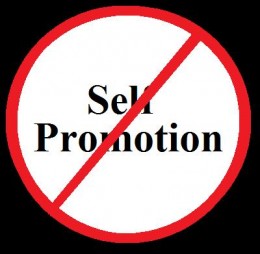The following was cross posted from 21st Century Collaborative.com
This post has been percolating for awhile. I never wrote it because I felt I couldn’t do it justice. That the idea was too important to not express it clearly. Besides, who in their right mind would defend self promotion?
But this morning, I decided to throw caution to the wind. Why? What was the catalyst for my risk taking behavior? A book review. Yep, a blog post about the book Lani Ritter-Hall and I wrote recently called the Connected Educator: Learning and Leading in a Digital Age. So how did that post lead to this one? Because when I read Justin Yantho’s post I wanted to share it with the world. I wanted to scream to all my networks and communities, ” See, look… these ideas are important! Look what can happen if you think about the ideas and concepts we have shared in our book.” But of course to do something like that would seem arrogant and be cataloged as shameless, self promotion.
My question is why? Why is it shameless self promotion? Why is it when you promote your own ideas, those you authored, trust, and believe, it borders on being seen as self serving?
Disclaimer: Now let me state upfront, when I talk about self promotion in this post I am not talking about people who are all talk. Not the folks who only talk about themselves and their opinions, most of which are not related to any call to action or hard work on behalf of others.
It is part of our DNA
I was talking about this issue with a friend and suggested maybe we have this mindset because our parents drilled it into us. “Don’t toot your own horn; if it is good you will get noticed.” My friend told me, “I’m from Canada, and for us it’s not a parenting issue, it’s a national issue.” In Australia they call it the “tallest poppy syndrome”, and in Norway I was told that Americans are perceived as loud, rude, and arrogant, mostly because of our willingness to self promote. In working with Catholic and Jewish schools, I have been told that arrogance is associated with pride and that we should err on the side of humility. But is marketing our own ideas and work prideful if we really believe what we have to offer is useful, transformational, or helpful?
Self promotion is especially tough for women. In a culture where women are penalized or bombarded with guilt for self-promotion, often because of being connected to the stereotype of being powerful or pushy (i.e., not ladylike), it’s easy to opt to pursue other methods for success in an effort to be liked. But if you don’t rally for yourself, nobody else will. And what if others have reinforced that your ideas are worth promoting – what then? Interestingly, for women there’s also the concern about potentially hurting other people’s feelings. Women are hesitant to self-promote or talk about their achievements because they don’t want to dismiss or alienate less successful people.
Rethinking Self Promotion
If you think about it, no one is more passionate about your work than you are. No one else knows the depth of your experience, expertise and ideas. And no one can elaborate on your work as convincingly as you can. By delegating promotion just to others, you’re taking away your best opportunity to demonstrate the value of your ideas. You are muting your best spokesman. Isn’t it logical that if we believe in our message, not promoting it would be selfish, as it would deny people the opportunity to learn from what we have to say or do? Humility is an important part of success and character growth — but humility should not mean that we refuse to open doors for others and help them reach their goals, dreams and aspirations by modeling our work and ideas. It’s about sharing, not coercion.
I am not suggesting we have to play the role of a pushy salesperson or a self-consumed and annoying person to get ahead. But sharing what we have to offer to the world does require taking small steps outside your comfort zone and being willing to put yourself out there on behalf of your dream or vision. It really boils down to passion and believing in what you do.
 Promote the Ideas, the Vision, and the Dream
Promote the Ideas, the Vision, and the Dream
Anyone who knows me knows that I talk about Powerful Learning Practice (PLP) a lot. I believe in PLP. I believe in the work we do. I believe that the big ideas embedded in PLP’s model are the best hope we have for reculturing education systemically. This isn’t just about my livelihood. It’s my passion, my legacy, my way of leaving education better than I found it.
Here is the thing: when I talk about PLP, I am not talking about me. I am talking about “we”. I am talking about all the amazing educators who are taking the concepts back to their schools/districts and doing amazing things — things I might never think of — that no one has thought of before.
I am talking about how other educators are changing their learning environments. Take Voices from the Learning Revolution, a PLP sponsored group blog that contains zero marketing. PLP features our member’s work and their thinking about important topics in 21st century education. It’s a place where they can “self promote” their learning journey in community.
And I do not just talk about the “we” on our PLP website. I brag about PLPeeps anywhere others will let me do so. Some see that as self promotion. I was once turned down for a keynote for a large ISTE affiliate that had sought me out to present but had second thoughts when the committee discussion revealed the fear that all I would talk about was PLP. Which to be fair isn’t true — I keynote around the world and have yet to present on PLP. In fact, Will Richardson, my PLP co-founder and I have both agreed to rarely mention PLP in the keynotes and workshops we do because of the self promotion myth. But I have decided that in doing so we may be doing those who attend our sessions a disservice. If PLP is about enabling educators to become empowered and manage change in their schools shouldn’t we be sharing the ideas, the vision, and the steps folks need to take to be successful?
 It’s sharing that drives change for children
It’s sharing that drives change for children
Some of you reading this are probably thinking: “Well, sure you feel that way, you profit from people becoming part of PLP.” Yes, we do and so does everyone else who is part of the PLP family. But here is where the rubber meets the road— you do not have to be part of PLP to get access to the ideas and philosophy. We share it everywhere freely for anyone who wants to partake. My new book tells it all. It shows educators how to “do” PLP in your own local context. It has Get Connected activities that walk folks through the same kinds of things we do in PLP. Will’s book about PLNs also shares basic PLP philosophies.
To not self-promote the work we do is counterintuitive to promoting the shift we feel is needed for children to thrive now and in the future. If we truly believe that what we are doing, collectively, is changing education (and it is) then why wouldn’t we self-promote at every turn? Why would I let my fear of being judged for too much self promotion get in the way of helping make schools better places for children?
I am just going to say it: SHARING IS NOT SELF PROMOTION! That’s right — all bf caps… I yelled it. I told you I get passionate about this topic. Whether I am talking about PLP, my book, a blog post, a presentation or any other work I am giving myself over to on behalf of changing the world and making it better for children, then I am not self promoting! Rather, I am spreading ideas I believe will help you because I care.
And guess what: I am hoping you will reciprocate. I am hoping you will make me aware of your work, your ideas, your skills, so that if there is a way we can collaborate to make the world better, we can find each other to do so. Because if you are willing to take the backlash that comes from the myths of being “self promotional,” I will be able to find you, know you, and possibly work with you. In the 21st Century it is so important to know what those you know know. And how will I know what you know if you do not tell me? Brag a little, will ya? Make it easier for me to connect the dots. We are all busy and time’s a’wasting. I need to find you fast.
 Dance When You Make a Touchdown!
Dance When You Make a Touchdown!
I had someone famous who lives in Canada tell me once that my problem was that I dance when I make a touchdown. He said, “Like American football players, Sheryl, you tend to dance when you make a touchdown. Rather you should score and just act like it is business as usual.” I will say to you what I said to him: I will not only dance when I make a touchdown, I will dance more wildly when you do.
I have to know about your good work to celebrate with you. I can’t depend on someone else telling me about it. It will take too long, it is too risky, and I’d rather hear it with your passion and knowledge than a watered down version from someone who might leave out the pieces that are most important to my learning.
Let’s make a pact to get over ourselves. If you are doing good work, if you have great ideas, if you have skills that could make a difference — Dance. Tell me. Tell us all. Self promote. I, for one, promise to high-five, re-tweet and share with others so together we can leave education better than we found it.
Latest posts by Sheryl Nussbaum-Beach (see all)
- “We have done this before, we can do it again.” - October 15, 2020
- Are you Remote Learning or Connected Learning? - October 6, 2020
- Passion Based Learning: Personalize Your Blended Curriculum - September 4, 2020




I’m with you, Sheryl. What others see as self-promotion, I see as selfless sharing. I’m completely jazzed when others point me to resources and ideas and thoughts that they’ve created — and almost always decided to share freely with the rest of us.
An example in action: The other day, I was sharing content on using iPads in education. John Larkin (@john_larkin) saw my bit and pointed me to a bit on his blog that included links to DOZENS of great #ipaded resources I’d never seen.
Had John not shared his bit with me — something that others might consider self-promotion — I’d have never found his bit.
In the end, I’m grateful that people are sharing ideas and resources and thoughts and strategies with the rest of us — even when those ideas are their own.
Good stuff,
Bill
Thanks Bill. I think the key here (at least for me) is when we are sharing that the focus isn’t on me and how great or how lowly and humble I am but the focus is on the work–the ideas– what can I share with others that I am doing to save them time, energy or that will help them help others.
Hi Sheryl! This is a terrific article. Even though it was posted in 2012, it still holds so much merit today. I have been writing a book on how to teach research skills in the classroom and came across your article when I was researching different ways to promote yourself in the educational realm. Wonderful article! Thank you!